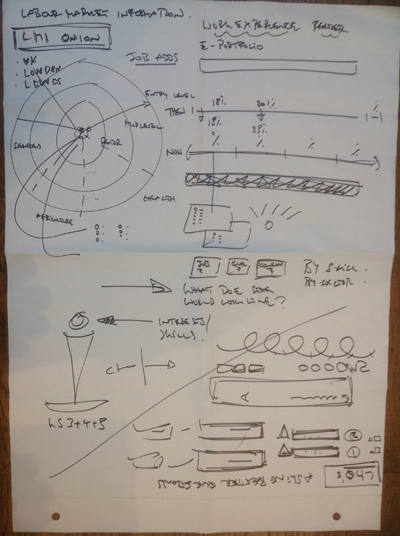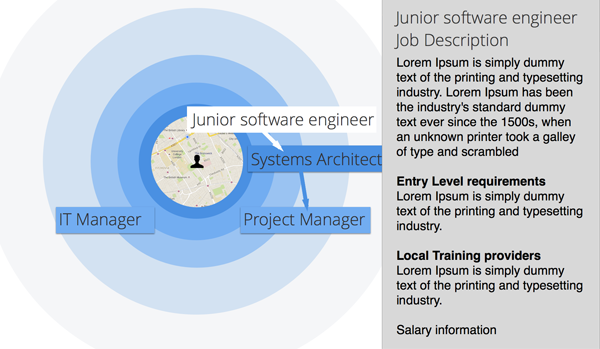The LMI Onion goes to #jobhack - a Cabinet Office Event
Published on 20 Oct, 2015Late Friday afternoon I checked twitter to find an event going on in London about using big data to help tackle youth unemployment. Given my pre-occupation with how video case studies tie in with big data projects like ‘LMI for All’ I signed up. However as the #jobhack was scheduled for the following Monday (yesterday) I suspected I was a little late to the party. However the email from the Cabinet Office came swiftly and I was ‘in’. A few phone calls later and my long term friend and collaborator Simon Hamilton was also ‘in’ and we were on our way to the #jobhack. For information LMI stands for Labour Market Information and can be used to describe pretty much all and any job data.
On arrival yesterday we were greeted, treated to pastries, and then led into the set-up talk from the minister Matthew Hancock on the convergence point between tackling youth unemployment and the need to break down department silos, eliminate duplication of effort and encouraging all government departments to publish their datasets. In other words what role does big data have to play in helping tackle one of the biggest issues of our day? On that note he said ‘over to you’, meaning us.
As we formed teams Simon and I were joined by Harri, an eighteen year old programmer and Naqi a Cap Gemini junior software developer. This also seemed like a good opportunity to sketch out with the group a big data idea called the ‘LMI Onion’ I’ve been thinking about to help schools address the mismatch between young people's aspirations and actual labour market patterns on the ground. The envisaged application, or Onion, uses to aggregated job advertisement data to visualise entry level jobs in any given locale, as they orbit a post-code chosen by the class, or as it later panned out, a mobile device on the street. The outer layer of the onion represents entry level jobs, the middle layer mid-career, and the centre more senior or late career roles. My original idea was for the Onion to be built as careers education tool for use ahead of option choices in work in the classroom. The real learning is about the relationship between sectors but using the local job market as the way in. For me this was more about the relationship between sectors than individual roles. More about pattern than jobs search. With a time dimension added of jobs adds the spread of jobs adds in the past could compared with the present, with teachers the able to discuss larger labour market trends and patterns. As such you move from job advertisements in a familiar locale to students, to then tease out talk about macro-trends and larger labour market needs. Second and third ideas were also tabled but my resolve to see the LMI Onion sliced and diced became a mission.

During a quick lunch our team grew as Neil a former management consultant joined us, and with useful bite pointed out the information being conveyed was quite dry, and in danger of losing young people’s attention. A wider debate ensued about whether this was an education tool for the classroom or a job-search tool for slightly older post 16 youth. He also brought into the debate whether the concept was trying to redirect aspirations (which it is) and whether this was in-fact appropriate and felt that a profiling component could start to move the debate towards exploration of skills and transferability. In other words the concept was becoming more about the individual than the pattern and the locale. More about job search than education.
By this time we really needed to crack on with an outline design and we drafted a user flow for Simon to quickly illustrate. The relationship between sectors was dropped, and primacy given to careers pathway, or layers of the onion, from entry level jobs and also the supporting information anyone would need being readily available alongside. As such, an entry level jobs advertisement would be associated with jobs description, entry level qualification and links to local training providers. We then huddled round Simon and started to put some flesh on the onion ahead of our presentation of the work to the audience and other teams at the end of the day. I will let others judge of the merit our rapid prototyping but the discussion process was robust and instructive.

My thanks to the organisers from the Cabinet Office, the team for letting me see the LMI Onion through, the Digital Catapult people and everyone that took part. We were set an important challenge that’s writ large on many people’s minds. Big data definitely has a role to play as do professional guidance services for young people facing both opportunity and challenge in an ever more competitive, unequal and complex world.